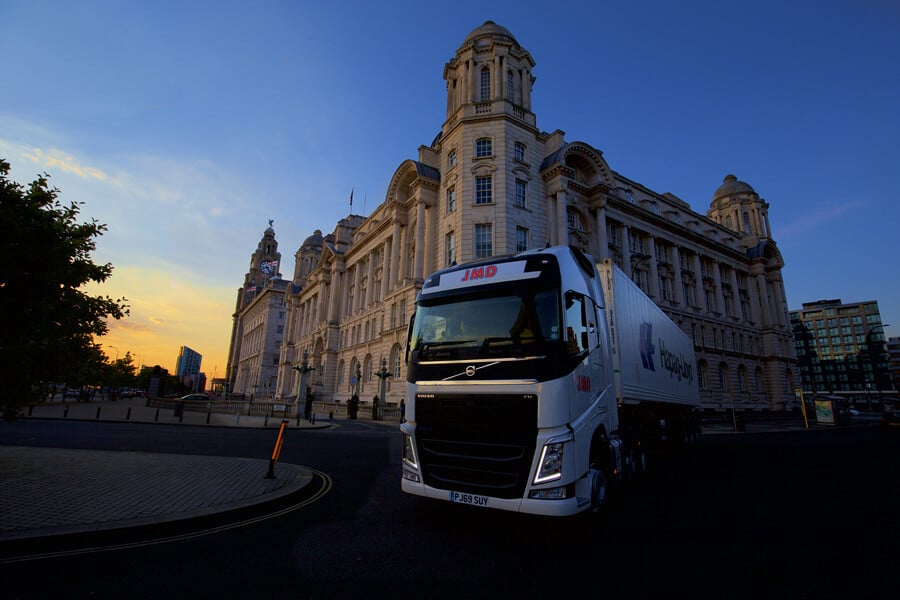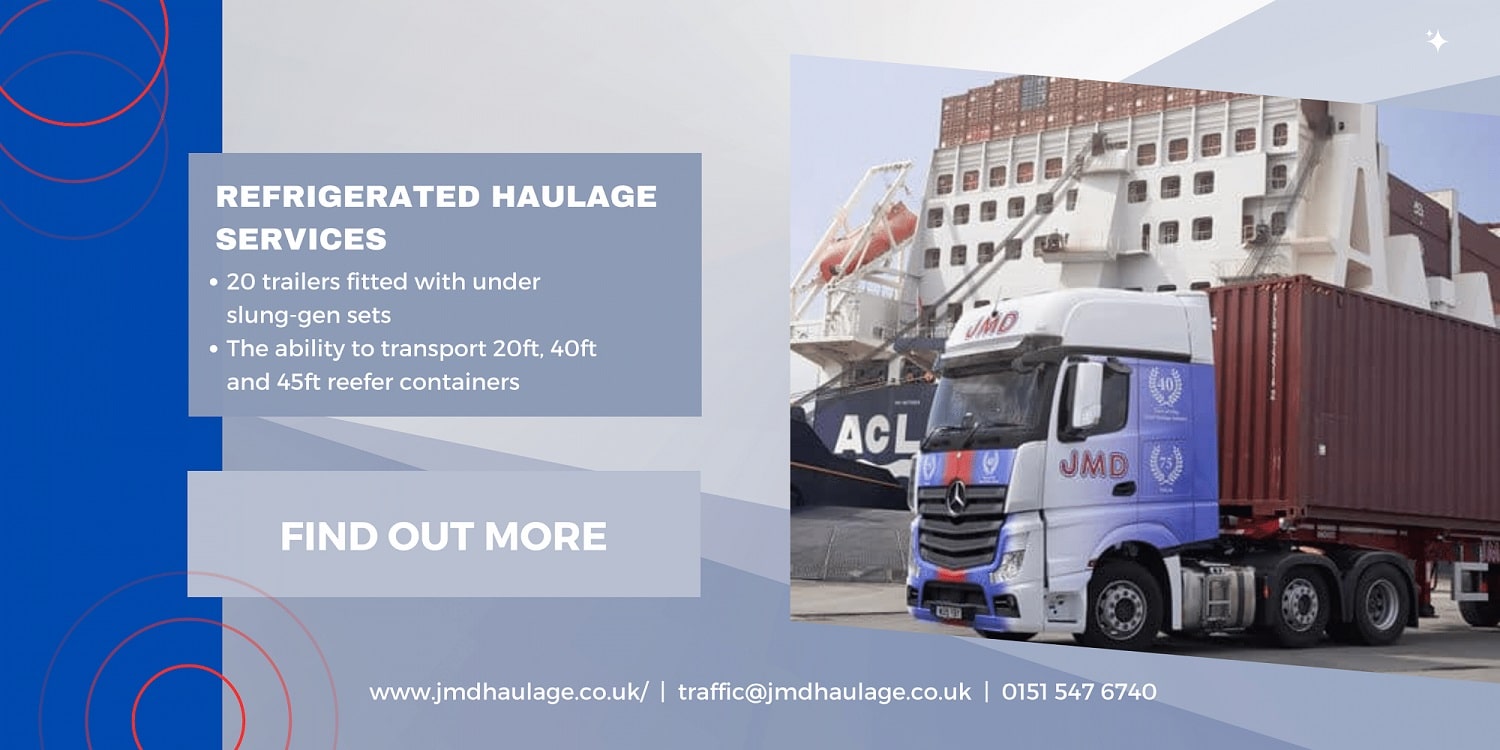Over the last couple of decades, the world has really opened up, internet commerce has dominated the way we shop, and this, in turn, means that the need to transport goods has also grown exponentially. When demand goes up, more companies are formed to handle the vast number of requests, and this includes a requirement for refrigerated transportation, a specialist service that JMD Haulage has been providing for more than four decades.
What is Refrigerated Transportation?
Refrigerated Transport, otherwise known as temperature controlled haulage, is the term for the transport phase of any cargo that needs to be kept at a controlled temperature. A vehicle capable of transporting refrigerated goods must have a built-in refrigeration system that must be regularly serviced and maintained and able to provide evidence that it is working correctly at any time.
How Does it Work?
Specialised freight trucks have three main components to create the refrigerated element needed to safely transport cargo that requires specific temperatures. First, there is a compressor that injects and compresses the gas-based refrigerant. This needs a small engine to power it and create the pressure needed. In a later part of the process, the condensed gas is liquefied. The second element is the condenser, which needs to absorb any water generated by the compressor. In a similar way to a condenser tumble-drier, this is a heat exchange, and the heat is transferred from the liquid into the refrigerated walls of the container. Finally, an evaporator is installed in the trailer, and this has the control valve that determines how much refrigerant is emitted to control the temperature.
Refrigerated Haulage Services Costs
Due to the increased complexity of refrigerated transportation compared with a standard container, it can be more expensive. However, at JMD Haulage we always aim to provide a professional and affordable service to all of our customers, which is why many leading food companies use us as their go-to refrigeration transport specialists. For your personal refrigerated transportation quote, please get in touch.
Types of Products that Require Refrigerated Haulage
Meat, seafood, fruit, and vegetables all require refrigerated temperatures. Food that we import from overseas is often transported in refrigerated units. Food that is moved around the country, from central depots to regional stores, requires refrigerated transport. Refrigeration helps to keep food fresh for longer and extends the shelf life and quality of many products.
How Is Temperature Controlled During Refrigerated Haulage?
Specialist refrigeration vehicles known as isothermal vehicles are designed to maintain a consistent temperature to keep all products at the correct temperature. Modern refrigeration units are designed to provide consistent and reliable temperatures during travel. Adhesive thermometers can be attached to items inside the units to ensure that the correct temperatures are maintained.
Temperature Requirements For Different Types Of Products During Refrigerated Haulage
Cold chain logistics require different temperatures for different products. It is important that these are closely adhered to as this preserves the quality and flavour of the food, and ensures that it is in good condition on arrival.
- -28 °C to -30 °C Deep freeze — mainly used for seafood.
- -16 °C to -20 °C Frozen — meat, and frozen bakery.
- 2 °C to 4 °C Chill — fresh fruit and vegetables, and fresh meat.
- 2 °C to 8 °C Pharmaceutical — medicines, vaccines.
- 12 °C to 14 °C Banana – for ripening bananas during shipping.
Benefits
1. Rising demand for fresh perishable goods
The bottom line is that refrigerated transportation is about keeping goods fresh. Many goods that require refrigerated transportation could not survive as usable products if they were not kept chilled or frozen. The world is such that there has been a rising demand for fresh goods like meat, vegetables, fruits, and other foods, partly because of the healthy eating culture and somewhat because we are being encouraged to eat a more vegan diet.
2. Perishable product shippers rely on refrigerated delivery service
When it comes to perishable products, they need to arrive at their destination in good condition. If they were not transported in refrigerated containers, they would degrade on the journey and lose saleability. Poorly transported food entering the market could be disastrous and leave consumers with food poisoning.
Failure to transport in the correct manner could also result in some items perishing and going bad. Meat, seafood, vegetables, and many other products need controlled temperature transportation to ensure no loss of taste or quality before the items reach the end consumer. We simply could not service the supply and demand needs globally if we did not have refrigerated transport available to move sensitive products.
3. Refrigerated freight applied to a wide range of types of products
The refrigerated freight industry includes things like pharmaceutical and medical items. Certain chemicals and even live animals need to be kept at controlled cooled temperatures making this an extensive section of the freight industry. Art dealer services also employ refrigerated freight that moves precious art at cool temperatures.
4. Compliance with the regulation in the world of shipping
The logistics required to transport chilled goods require many pieces of legislation to be observed. There are two primary guidance documents in the UK to note: The Food Safety and Hygiene (England) Regulations 2013 and the Regulation (EC) 852/2004. In the United States, refrigerated transport is regulated by the FDA. Goods can travel thousands of miles internationally, so it is essential that every country regulates the process well. The UK and European regulations are closely related to ensure easy movement in controlled temperatures.
To fully comply, refrigerated courier must have a complete record of the monitoring of these temperatures. There are times when the goods can be outside of this ‘below eight’ temperature, but these are for very short periods, for example, when the goods are being loaded and unloaded from the vehicles.
Regulation That Makes Refrigerated Delivery Service a Must
UK transportation rules state that during refrigerated transportation, the temperature of the food (as an example) must be refrigerated to below 8 degrees Celsius; this includes fresh and perishable produce, ready meals, dairy products, and any goods that have a use-by date and is classed as chilled produce. The Food Safety and Hygiene (England) Regulations 2013 state that this is to ‘Inhibit or prevent harmful microorganisms from multiplying.
State Of The Refrigerated Freight Industry
The logistics of transporting goods in a controlled temperature environment is actually a lot older than people think. The first transportation to use refrigeration was way back in the 1800s when ice and salt were placed underneath temperature-sensitive goods being transported on the freight rail network. It wasn’t a very good system, and there was a significant loss of goods due to spoilage.
By the 1900s, the process had been developed to a stage that made this method of transport a lot more reliable, and the industry has continued to grow from there.
Refrigerated Transportation at JMD Haulage
JMD Haulage is a leader in refrigerated transport. Our state-of-the-art systems use internet-based technology, and records to prove the temperature is controlled are automated, meaning there is a constant record of temperature, making the process of moving temperature-controlled goods the safest it has ever been.
If you need to use controlled-temperature transportation, why not get in touch and see what we can do.
Refrigerated Haulage FAQs
1. How do you handle cross-border transport regulations?
We deal with UK refrigerated haulage. When we are working with a freight forwarder to provide transportation for the UK section of international transportation, for example collecting refrigerated units from the docks, we will deal with the paperwork with the freight forwarding company.
2. What measures do you take to prevent contamination or spoilage of cargo?
Our refrigerated transportation units are well-maintained and thoroughly cleaned between trips. This helps to ensure that no cross-contamination can occur.
3. Can you provide customised temperature settings for specific cargo types?
Different food needs to be transported at different temperatures. Our refrigerated transport units allow us to control the temperature.
4. How do you handle maintenance and repairs of temperature-controlled equipment?
All our units are regularly serviced and maintained to ensure a high standard.
5. What are the energy efficiency measures taken by refrigerated haulage companies?
We follow the latest developments in manufacturing and developments to ensure that we invest in the most energy-efficient refrigerated transport available. We always transport optimum loads to increase the efficiency of every journey.
6. How are environmentally-friendly practices incorporated into refrigerated haulage services?
Modern refrigeration systems are far more environmentally friendly than their older counterparts. The gases used in refrigeration units can be harmful, but ensuring that we invest in the latest technology reduces the negative impact of refrigeration gases.
7. How can I ensure the quality and safety of my cargo during refrigerated haulage?
Your cargo will be kept to the correct temperature, and transported with the same care and dedication that we bring to every job that we undertake.
8. What are the environmental impacts of refrigerated haulage?
Refrigerated haulage does have an environmental impact, however, as the technology improves, we can constantly upgrade our fleet and processes, so that we continue to reduce the environmental impact of refrigerated haulage.



